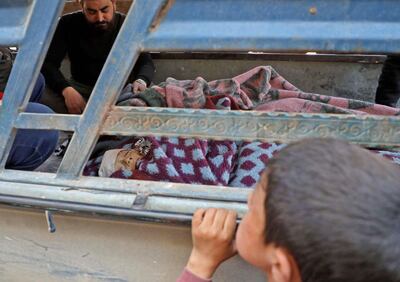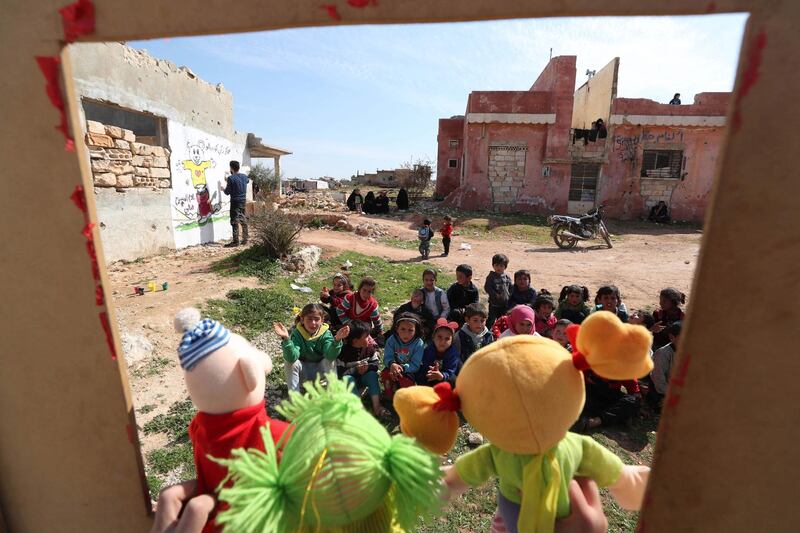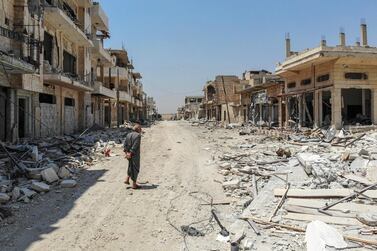Four years ago this week, the Syrian government bombed the town of Khan Sheikhoun with chemical weapons. More than 80 people, including women and children, and almost three dozen members of one family, suffocated to death in the dawn attack. It was the second deadliest chemical attack of the war, a culmination of years of war crime upon war crime.
We know this because the facts have been established by multiple UN and independent investigations of the incident. And they have concluded: Sarin gas was used in the April 4, 2017 attack in Khan Sheikhoun and the Assad regime was responsible.
I know this because I was there two days after the attack. I saw the freshly dug graves, the empty warehouse that the regime claimed to have bombed that day, the destroyed hospital that was treating victims. I saw every movement and every word of a father who lost his wife and two infant children in the attack.
The regime of Bashar Al Assad was already ascendant at the time and well on its way to winning the war. What did a few dozen more dead human beings matter when every day brought with it a new atrocity?
As I listened to the stories of the victims and first responders, it was clear the regime deployed a weapon of war that is most insidious in its application, and would likely do so again.
Imagine being betrayed by the very air you breathe. Instead of nourishing you, it exacts a painful death and whose talons grasp at even those who come to rescue you. There is no safe place either, above or below ground. When I visited, it was like only ghosts remained. The goal of tyranny, hatred and terror had been met.
When the sarin attack happened, Abdul Hamid Al Yousef sent his wife and two kids to safety in their basement near the bombing, and rushed to help the survivors. He collapsed and was taken to the hospital, having inhaled toxic gas. When he regained consciousness, he rushed home and found his family dead. His photograph holding them before the burial went viral on social media.
Even then it was clear that justice would not be done for Abdul Hamid’s family. He took comfort in a saying – a hadith, recounted to him by a man sitting next to him at a memorial service I attended, who told him that bearing the loss of his children with patience and forbearance means that on Judgment Day they would be resurrected with wings and fly him to paradise. It was the only time during the service that I saw a glimmer of life in Abdul Hamid's eyes.
I do not know how one carries on after a tragedy like that, especially now that I have a son of my own. I do not know how an entire nation can do that, after 10 years of starvation sieges, torture, barrel bombs, bombs dropped on hospitals, markets, schools, mosques and churches. How do you pick up the pieces when there are no pieces left, when the wrongs are so monumental? How do you make peace if your family has suffocated to death?
I cannot contemplate such a peace without the perpetrators being brought to justice. Peace and reconciliation can only be achieved when there is an honest accounting of the wrongs of the past. When there is accountability for the hundreds of thousands who died in the Syrian war and who were tortured and mutilated in prisons. When those who weaponised the air we breathe are made to answer for their crimes. Some efforts have begun in Europe, but they are not nearly enough.
Khan Sheikhoun was only a landmark along a path littered with atrocities. The crimes were always there for all to see, with Syria being the most well-covered conflict in history. The fact that such cruelty was allowed to continue with impunity is not a failure of journalism. It is a failure of humanity.

In Syria, hospitals were bombed without consequence. Because of Syria, indiscriminate bombing, ethnic cleansing, hunger as a weapon of war, and chemical attacks were accepted as normal. And we knew about it every time. The facts are evident for those who wish to see.
On the way out of Khan Sheikhoun, I went to the local cemetery. The cinnamon-coloured earth was freshly dug, most of the gravestones still unmarked. I said a prayer before leaving. I hope we will have more than unanswered prayers to show in four more years, for the families of the town and thousands of others across Syria.
Kareem Shaheen is a veteran Middle East correspondent in Canada and a columnist for The National






